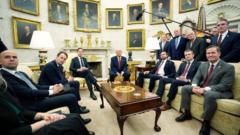The leaked Signal chat unveiled candid exchanges among high-ranking officials regarding U.S. military action in Yemen, including Vice President JD Vance's concerns and an emphasis on messaging strategies that blame the Biden administration for the decision.
Security Breach: Insights from Leaked Trump Administration Chat Group

Security Breach: Insights from Leaked Trump Administration Chat Group
A recently leaked chat group from the Trump administration reveals a concerning security breach involving discussions on military operations against the Houthis in Yemen.
In a significant development in U.S. national security affairs, a leaked chat group from the Trump administration has come to light. This breach involves sensitive discussions regarding military strategies against the Iran-backed Houthi group in Yemen and includes high-ranking officials such as Vice President JD Vance, Defense Secretary Pete Hegseth, and National Security Adviser Mike Waltz.
Journalist Jeffrey Goldberg of the Atlantic magazine was inadvertently added to the Signal messaging group, where he reported viewing classified military plans and timelines just hours before airstrikes were executed. This revelation has sent shockwaves through Washington, as concerns mount over national security protocols.
One key takeaway from the leaked messages is Vance’s skepticism about the military action. He expressed doubt over whether attacking Houthi forces would primarily benefit European interests rather than U.S. interests. Vance remarked, “If you think we should do it let’s go. I just hate bailing Europe out again,” underscoring a debate within the administration about the implications of U.S. military aid abroad.
Further complicating the narrative, a member identified only as "SM" suggested that any U.S. military intervention should come with demands for economic compensation from Europe. This sentiment reflects long-standing frustrations voiced by Trump and his aides regarding what they perceive as Europe’s lack of investment in its own defense.
As the airstrikes commenced, reactions within the chat highlighted a blend of relief and apprehension. The emojis shared in the group reflected a mix of support and a desire to project an image of American strength, with members responding enthusiastically to the strikes while strategizing how to frame the narrative against the backdrop of critiques of President Joe Biden.
The incident raises serious questions regarding security management within the administration, especially as many Democrats are now calling for an investigation. When asked about the matter, Trump denied any knowledge of the leaked chat, while Hegseth attempted to downplay the gravity of the exchanges, claiming no military secrets were disclosed. The fallout from this breach is likely to have lasting implications as calls for accountability echo through the halls of Congress.





















